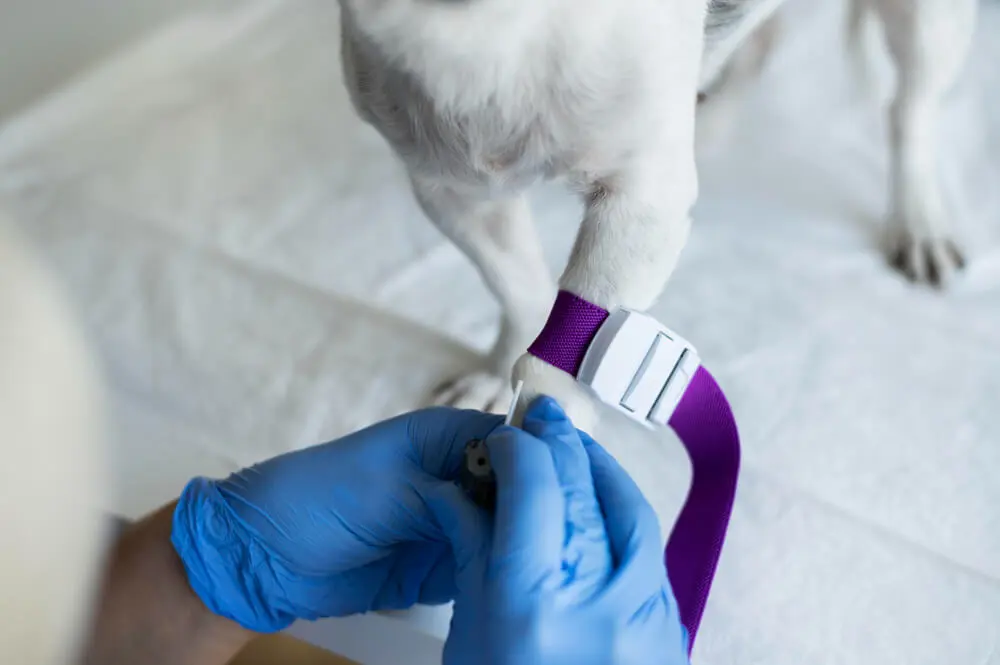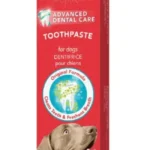Why does my dog smell like ammonia? If you recently discovered your furry friend is the reason behind the ammonia smell in your hours, don’t panic. At least, not yet. There could be many reasons, ranging from everyday play to serious medical issues. Let’s sniff out the reasons together so you can enjoy cuddle time without smelly interruptions.
Possible Reasons Behind the Ammonia Smell
The reason behind the ammonia smell could be external or internal.
External Reasons
Why does my dog have a strong ammonia smell? It could be because of;
- Wet Fur
The ammonia smell on your dog could stem from something as simple as wetness in their fur. It is common, particularly around the ears and paws. Moisture can mix with bacteria and other organisms on the skin, producing a chemical smell.
- Urine Accidents
Another external factor is urine accidents or lingering traces of urine in their fur. Have your dogs had an accident inside or laid down where they or another pet have gone to the bathroom? Then that could be the source of ammonia’s strong odor—a key component of urine.
- Improper Anal Gland Expression
In some cases, improper anal gland expression could be the reason. Anal glands can produce a very pungent odor when they’re not expressed regularly, either by the dog itself during defecation or through manual expression.
- Rolling in Something Smelly
Lastly, dogs have a habit of rolling in things they find intriguing, which often includes substances with strong, offensive odors. This behavior could result in a surprising ammonia-like smell if your dog decides to take a tumble in something smelly.
After considering these external factors, it’s also critical to examine internal health issues that could be at play. If you’re wondering, “What infection causes ammonia smell?” or “What are signs of a UTI in a dog?” it’s time to delve into the internal factors.
Internal Reasons
Sometimes, your dog might be smelling like ammonia due to some internal factors like;
- Urinary Tract Infections (UTIs)
UTIs are a common cause of strong ammonia odors in dogs. These infections can cause your dog’s urine to smell stronger than usual, indicative of a problem.
- Bladder Stones
Bladder stones can also cause a shift in the concentration and make-up of a dog’s urine. These stones can trap bacteria and contribute to a strong ammonia scent.
- Liver or Kidney Disease
Liver or kidney disease can lead to toxins building up in the body, which may give off an odor that can be mistaken for ammonia. Smelling ammonia on your dog could be a symptom of something more serious, such as liver or kidney disease.
- Diabetes
Lastly, diabetes can cause a change in the odor of your dog’s breath or urine. Unregulated diabetes can lead to a sweet, chemical-like smell, often compared to the scent of ammonia.
Understanding these potential causes can guide better care for your dog, ensuring that “Why does my dog smell like ammonia?” is a query of the past. If you suspect any of these conditions, it is crucial to consult with your veterinarian promptly. Finding out what is behind the smell will address it, leaving you more time for joyful moments with your healthy, happy pet.
How Can I Tell What is Causing the Smell?-How to Be Certain
Distinguishing the cause of an ammonia smell on your dog involves a mix of nosework and observation. If the scent is overwhelmingly strong, it may hint towards a urinary tract infection (UTI), where even a small accident can fill the room with a sharp ammonia odor. Pay attention to your dog’s bathroom habits – frequent urination or signs of discomfort suggest a trip to the vet is in order.
On the other hand, a more mild but constant smell could indicate lingering urine in the fur or an issue with anal glands. The odor might not be as pungent in these cases and will often be localized to certain body areas. Keep an eye out for additional signs, such as residue or discoloration on the fur or your dog scooting across the floor.
If your dog is lethargic, has lost appetite, or you notice blood in their urine, it’s crucial to consider more severe conditions like kidney or liver disease, bladder stones, or diabetes. When combined with an ammonia scent, these symptoms signal that your pet needs medical attention.
What happens if a dog smells ammonia? If it’s exuding from your dog, it’s a red flag that something is off with their health. Always observe your dog’s overall behavior and any accompanying physical symptoms, and consult a vet to identify the cause accurately.
Clearing the Air: Remedies
After pinpointing the potential causes of the ammonia smell, it’s time we discuss pragmatic steps toward resolution. For external causes, here’s what you can do:
- Thorough drying: Whenever your dog gets wet, ensure they are thoroughly dried. This might mean using towels or a blow dryer on low heat, especially around ears and paws.
- Accident Clean-up: In case of urine accidents, clean the area with an enzymatic cleaner that breaks down the urine and discourages remarking.
- Anal Gland Care: Make an appointment with your vet to check and express the anal glands, if necessary. Consistent care prevents smells and discomfort.
- Proper Bathing: Bathe your furry friend using a gentle dog shampoo. Ensure you rinse thoroughly to avoid residue that can irritate the skin.
In cases of internal causes, immediate veterinary intervention is crucial:

- Veterinarian Visit: If you suspect a UTI, bladder stones, or other serious internal conditions, seek veterinary advice pronto. Your vet will conduct tests, possibly including urine analysis, blood work, or imaging.
- Follow Vet Guidance: Adhere to your vet’s treatment plan, which may include antibiotics for infections or specific treatments for other diagnosed conditions.
- Observation: Monitor your dog’s recovery. Watch for improvement in both scent and behavior and report any concerns to your vet.
Addressing each of these steps attentively will help eliminate the ammonia odor and contribute to the overall well-being of your cherished companion.
Cleaning Up Your Dog’s Accidents
How do you get the ammonia smell out of dog urine? The key is neutralization and prevention. Start with regular cleaning to keep your home and your dog’s kennel or crate fresh. Use white vinegar or baking soda solutions to dissolve the odor naturally. Mix equal parts of water and white vinegar and apply it to the affected areas.
Alternatively, you can sprinkle baking soda directly on dry spots, allowing it to absorb the smell before vacuuming. These substances efficiently combat the ammonia scent without harming your pet.
How do I stop my dog’s urine from smelling so strong?
Frequent walks and proper hydration can dilute your dog’s urine, reducing its potent smell. Also, consider quality absorbent bedding in the kennel and change it out regularly.
What gets rid of the ammonia smell?
A good bet is enzymatic cleaners, which break down the urine molecules that cause the odor. They’re pet-friendly and designed specifically for this purpose.
For a deep clean that disinfects, Lysol can be a go-to option, but ensure that it’s used in a well-ventilated area and your pet is kept away until the area has completely dried. This helps prevent any respiratory irritation for your dog and keeps your space smelling fresh.
Remember, tackling the ammonia smell is about comfort and your dog’s health, so do it with care and consistency.
Proactive Prevention Practices
To stave off future ammonia odors, start with regular vet checkups. These visits are vital for catching any underlying health troubles early. Keep good hygiene in check by taking your dog out for frequent walks and cleaning up accidents quickly. A fast response ensures odors don’t linger.
A healthy, nutritious diet and plenty of water support your dog’s digestion, resulting in less pungent urine. Keep an eye on how your pup acts and pees. If you spot odd symptoms or changes in pee patterns, don’t wait—talk to your vet.
Other Tips
Maintaining a clean and sanitary living environment is essential for you and your pet. Still, beyond cleanliness, there are a few additional considerations that dog owners should be aware of to prevent and tackle the scourge of ammonia odor.
- Diet Adjustments: Sometimes, what your dog eats can influence the odor of their urine. High protein diets, for example, can lead to stronger-smelling urine. Discussing your dog’s diet with a vet could result in alterations that might reduce odors.
- Floor and Fabric Protection: Consider using waterproof mats or pads in areas where your dog spends a lot of time. These can protect your floors and make cleanup easier in case of accidents.
- Ventilation: Good ventilation is key in reducing any odors in your home. Ensure your space is well-aired, with fresh air regularly circulating to prevent ammonia and other odors from becoming trapped and concentrated.
- Professional Cleaning Services: In some cases, pet odors can become deeply embedded in carpets and upholstery, making it extremely difficult to remove them completely. In such instances, it may be necessary to call professional cleaning services specializing in pet odors.
- Health Supplements: There are also specific supplements that can help maintain a healthy urinary tract in dogs. Consult your vet for recommendations on whether these could benefit your pet.
By considering these additional factors, pet owners can better manage and reduce the incidence of ammonia odors and contribute to a healthier and more enjoyable home environment for humans and their canine companions.
Take Away
Ammonia odors can be a nuisance, but the responsibility of owning a pet comes with these challenges. Luckily, the solutions are easy to implement. While the approaches outlined here are straightforward and effective, don’t hesitate to consult a veterinarian if you’re uncertain or the situation seems persistent. Professional advice is paramount when it comes to the health of your furry friend.
Why does my dog’s urine smell strongly of ammonia?
The strong ammonia scent in dog urine is typically due to a high concentration of waste products such as urea. This can occur due to dehydration, diet, or urinary tract issues. It’s essential to consult a vet to rule out any medical concerns.
Can a change in my dog’s diet reduce the ammonia smell in its urine?
Yes, diet can influence the smell of your dog’s urine. Feed your dog high-quality food depending on their specific health needs. Also, ensure proper hydration to help reduce strong odors. Consult your vet about dietary changes that may benefit your dog.
Are household cleaning products safe to use around pets to eliminate urine odors?
Many household cleaning products contain chemicals that can be harmful to pets. It’s crucial to use cleaners marketed as pet-safe, and even then, allow the cleaned area to dry completely before allowing your pet to return.
How can I prevent my dog from peeing indoors?
Regular walks, consistent potty training, and positive reinforcement when your dog pees outside can help prevent indoor accidents. Immediately cleaning up accidents with an enzymatic cleaner also discourages repeat marking.
Do professional cleaning services use pet-safe methods?
Most professional cleaning services offer pet-safe options designed to handle pet odors and stains while being safe for animals. It’s important to inquire about their methods beforehand.





